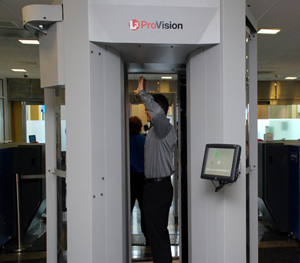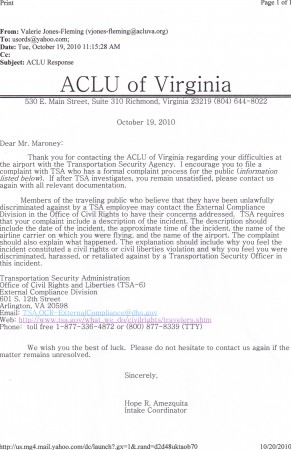WHY DID TSA EMPLOYEES BREACH THEIR OWN POLICY?
by Sharon Rondeau

(Oct. 21, 2010) — A reader of The Post & Email recently related an incident which occurred with employees of the Transportation Security Administration at Dulles International Airport in Washington, DC which he believes was a violation of his Fourth Amendment rights, despite the enhanced security following the terrorist attacks of September 11, 2001. The traveler reported:
I was going through a TSA check point at Dulles International Airport, which, of course, is a public airport. As my carry-on bag was going through the scanning machine, instead of asking me if I had a water bottle in my bag, the screener said, “A lot of people came through here with Flag shirts today.” Then he called over another TSA screener to search my bag. At the time I had no clue why they wanted to search my bag. After that remark I was brought over to a separate table. Before the search took place I grabbed my video recorder and started recording because of what they said to me and what had happened to the college student that had a white powdery substance placed into her laptop case by a TSA Officer, and I wanted to protect myself.
The TSA website states, “We don’t prohibit public, passengers or press from photographing, video taping, or filming at screening locations.” A blog entry at the TSA website seems to suggest that “vigilance” in the form of picture-taking is encouraged, stating, “In fact, many photographers would be prime candidates to use such vigilance programs to report suspicious activity since they’re extremely observant of their surroundings.”
The airline passenger made the following statement about why he stopped videotaping the incident:
The reason why I didn’t continue video taping after the ” confidential security information ” was said. Was because the PD arrived shortly after I stopped recording and threatened me with arrest or keep me detained up to 4 hours, for video taping. They said I was obstructing justice. They also considered video taping disorderly conduct.
Between the 3:49 – 4:43 minute mark to the right of the screen you can see the TSA employee, before he searched my bag, take off his name tag and put something over the lettering so it could not be read, then he pinned it back on his shirt and covered it with his hands. I did not see this happen because my head was turned speaking with his supervisor.
The Post & Email contacted the Metropolitan Washington Airport Authority (MWAA) to ask if it was their police department which reported to the scene. The MWAA returned a telephone call to us, said that it would research it further. Later on Thursday their representative left us another message stating that they needed to check with their dispatch records and were “still working on the request.” They had also advised us to direct our inquiry to the TSA.
TSA’s statement from the Office of Civil Rights and Liberties reads, in part:
Quite simply, our policy statement assures travelers they will be treated in a fair, lawful and nondiscriminatory manner. It also emphasizes we have no tolerance for harassment in the treatment of the public we serve. Finally, it outlines out how we ensure an environment free of discrimination through program, policy, and operational reviews.
A video of another traveler who was allowed to videotape the TSA searching his bag without incident is here.
On October 20, 2010, the TSA sported a headline from a USA Today article entitled “Most OK with TSA Full-Body Scanners.” The article is dated January 11, 2010. However, comments placed in various internet forums do not appear to indicate that the public is supportive of the measure.
A CNN article from early this year reported that a privacy group’s findings were that the TSA was “misleading the public with claims that full-body scanners at airports cannot store or send their graphic images.” A report dated October 20, 2010 states that an airline pilot has refused to undergo both a full-body scan and “pat-down” and says that such searches have resulted in his having been “harassed or molested without cause.”
The traveler’s video of the incident at Dulles Airport is here. His commentary is as follows:
At the 2:34 – 2:43 minute mark you can here one of the tsa officers say; tsa 1: “Did he have something sharp in his bag. TSA 2: No it looked like he had a bottle of water in his bag”. There was at one time four of them around me. The point is the reason why I had to stop recording before they would tell me why they wanted to search my bag was because it was “sensitive security information” said by Warren Wood for the transpertation security administration(TSM he said, not TSA). If it was sensitive security information that I had a water bottle in my bag why was it said out loud in public on video?
A recent article in The Baltimore Sun describes an incident wherein a man stopped by police filmed the events on camera, and a judge ruled that he was within his rights to do so. A similar story from Pennsylvania is here.
After filing a complaint with the ACLU, the traveler received the following response:

The text of the letter reads:
Dear Mr. Maroney:
Thank you for contacting the ACLU of Virginia regarding your difficulties at the airport with the Transportation Security Agency. I encourage you to file a complaint with TSA who has a formal complaint process for the public (information listed below). If after TSA investigates, you remain unsatisfied, please contact us again with all relevant documentation.
Members of the traveling public who believe that they have been unlawfully discriminated against by a TSA employee may contact the External Compliance Division in the Office of Civil Rights to have their concerns addressed. TSA requires that your complaint include a description of the incident. The description should include the date of the incident, the approximate time of the incident, the name of the airline carrier on which you were flying, and the name of the airport. The complaint should also explain what happened. The explanation should include why you feel the incident constituted a civil rights or civil liberties violation and why you feel you were discriminated, harassed, or retaliated against by a Transportation Security Officer in this incident.

Interesting article and corresponding video.
So what is it that the TSM official told the “reader” after he turned the camera off as to why he could not continue recording the event? What is so sensitive about a government official searching a bag?
Also interesting is the comments have been disabled on YouTube with this video. Is that something YouTube does or the person posting the video?
———————–
Mrs. Rondeau replies: The Post & Email had inadvertently left out some explanatory information on your question. The article is now updated.
The poster of the vid disables comments. In my experience, often this is done on controversial vids where people are likely to point out inconsistencies. That’s just my 2cents.